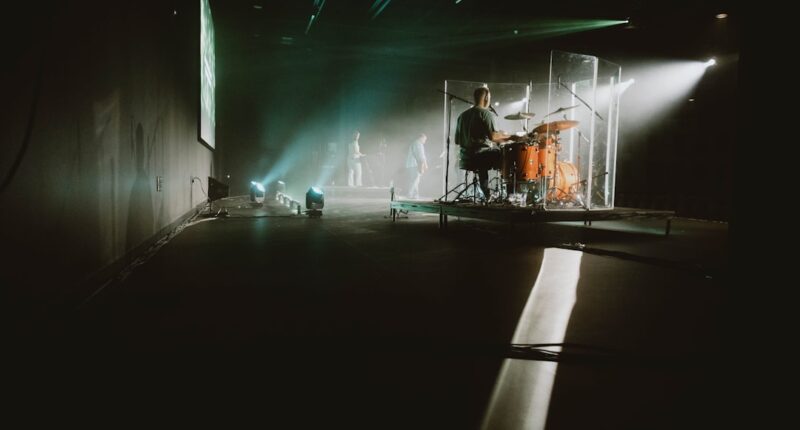The music industry is a vibrant and dynamic field that encompasses a wide range of roles, each contributing to the success of artists and their music. Among these roles, music promotion jobs stand out as crucial for connecting artists with their audiences. Music promoters play a pivotal role in ensuring that new releases, concerts, and events reach the right ears, helping to build an artist’s brand and fan base.
As the landscape of music consumption continues to evolve with the rise of digital platforms, the demand for skilled music promoters has never been greater. This article delves into the intricacies of music promotion jobs, exploring what they entail, the skills required, and how one can embark on a career in this exciting field. In an era where independent artists can gain global recognition through social media and streaming platforms, the role of a music promoter has transformed significantly.
No longer confined to traditional methods of promotion, such as radio play and print advertising, modern music promoters leverage digital marketing strategies, data analytics, and social media engagement to maximize an artist’s reach. This shift has opened up new avenues for creativity and innovation within the industry, making it an appealing career choice for those passionate about music and marketing. Understanding the multifaceted nature of music promotion is essential for anyone looking to make their mark in this competitive arena.
Key Takeaways
- Music promotion jobs involve promoting and marketing music to increase its visibility and popularity.
- Music promoters work to create buzz and excitement around an artist or a specific piece of music.
- Skills and qualifications needed for music promoter jobs include strong communication, marketing, and networking abilities.
- Different types of music promoter jobs include radio promoter, online promoter, and event promoter.
- To get started in the music promotion industry, aspiring promoters can gain experience through internships, networking, and building a strong online presence.
What Does a Music Promoter Do?
The Role of a Music Promoter
At its core, a music promoter is responsible for creating awareness and generating interest in an artist’s work. This can involve a variety of tasks, from organizing live events and tours to developing marketing campaigns that highlight new releases. A promoter’s job is not just about getting the word out; it also requires strategic thinking to identify target audiences and tailor promotional efforts accordingly.
Understanding Target Audiences
For instance, a promoter might analyze streaming data to determine which demographics are engaging with an artist’s music and then craft campaigns that resonate with those specific groups. This approach enables promoters to create targeted marketing efforts that effectively reach and engage their desired audience.
Navigating Digital Marketing
In addition to traditional promotional activities, such as securing radio play or arranging interviews with media outlets, modern music promoters must also navigate the complexities of digital marketing. This includes managing social media accounts, creating engaging content, and utilizing platforms like Spotify and Apple Music to enhance visibility. A successful promoter understands how to harness the power of online tools to create buzz around an artist’s work.
Collaboration and Strategic Partnerships
The role is inherently collaborative, often requiring promoters to work closely with artists, managers, record labels, and other industry professionals to ensure cohesive messaging and branding. This collaboration can also involve partnering with influencers or creating viral marketing campaigns to further amplify an artist’s reach and impact.
Skills and Qualifications Needed for Music Promoter Jobs

To thrive in the competitive world of music promotion, certain skills and qualifications are essential. First and foremost, strong communication skills are paramount. A music promoter must be able to articulate ideas clearly and persuasively, whether they are pitching an artist to a venue or negotiating with media outlets for coverage.
Additionally, interpersonal skills are crucial for building relationships within the industry. Networking is a significant aspect of the job; promoters often rely on their connections to secure opportunities for their artists. Another vital skill is creativity.
The ability to think outside the box can set a promoter apart from others in the field. This creativity extends beyond just marketing strategies; it also involves finding unique ways to engage audiences and create memorable experiences around an artist’s brand. Furthermore, analytical skills are increasingly important in today’s data-driven environment.
Promoters must be adept at interpreting metrics from social media campaigns or streaming platforms to gauge the effectiveness of their efforts and make informed decisions moving forward. Educationally, while there is no strict requirement for a specific degree, many successful music promoters have backgrounds in marketing, communications, or business. Courses in music business can also provide valuable insights into the industry’s inner workings.
Internships or entry-level positions within record labels or event management companies can offer practical experience that is highly beneficial when pursuing a career in music promotion.
Different Types of Music Promoter Jobs
| Job Title | Description | Skills Required |
|---|---|---|
| Concert Promoter | Organizes and promotes live music events and concerts | Event planning, marketing, negotiation |
| Online Music Promoter | Promotes music and artists through online platforms and social media | Digital marketing, social media management |
| Radio Promoter | Promotes music to radio stations and secures airplay for artists | Networking, communication, music industry knowledge |
| Club Promoter | Organizes and promotes music events at clubs and venues | Networking, event planning, marketing |
The realm of music promotion encompasses various roles, each with its own focus and responsibilities. One common type is the concert promoter, who specializes in organizing live events and tours. These professionals are responsible for securing venues, coordinating logistics, and marketing shows to ensure ticket sales meet expectations.
Concert promoters often work closely with artists’ management teams to align on tour schedules and promotional strategies. Another significant role within music promotion is that of a digital marketer or social media manager. In this capacity, individuals focus on promoting artists through online channels.
They create content for social media platforms, manage advertising campaigns on sites like Facebook and Instagram, and analyze engagement metrics to refine their strategies. As digital consumption continues to dominate the music landscape, these roles have become increasingly vital for an artist’s success. Publicists also play a crucial role in music promotion by managing an artist’s public image and media relations.
They craft press releases, coordinate interviews with journalists, and develop strategies for gaining media coverage. Publicists work diligently to ensure that their artists receive positive exposure in various outlets, from blogs to major publications.
How to Get Started in the Music Promotion Industry
Breaking into the music promotion industry can be challenging but rewarding for those passionate about music and marketing. One effective way to start is by gaining relevant experience through internships or volunteer opportunities with local venues, record labels, or music festivals. These experiences provide invaluable insights into the industry while allowing aspiring promoters to build their networks.
Networking is crucial in this field; attending industry events such as concerts, conferences, or workshops can help individuals meet established professionals and learn about potential job openings. Engaging with local music scenes can also provide opportunities to collaborate with emerging artists and gain hands-on experience in promoting their work. Additionally, developing a personal brand online can be beneficial for aspiring promoters.
Creating a professional website or social media presence that showcases one’s skills and interests can attract attention from artists seeking promotional support. Sharing insights about music trends or successful campaigns can demonstrate expertise and passion for the field.
Tips for Success in Music Promotion Jobs

Success in music promotion requires a combination of strategic thinking, creativity, and adaptability. One key tip is to stay informed about industry trends and emerging technologies that can impact promotional strategies. For instance, understanding how algorithms on streaming platforms work can help promoters optimize their campaigns for better visibility.
Building strong relationships within the industry is another critical factor for success. This involves not only networking but also maintaining those connections over time. Regularly reaching out to contacts with updates or sharing relevant information can keep one top-of-mind when opportunities arise.
Moreover, being proactive in seeking out new promotional avenues can set successful promoters apart from their peers. This might involve experimenting with unconventional marketing tactics or exploring partnerships with brands that align with an artist’s image. Embracing innovation while remaining true to an artist’s brand identity is essential for effective promotion.
Challenges and Opportunities in Music Promotion
The landscape of music promotion is fraught with challenges that require resilience and adaptability from professionals in the field. One significant challenge is the oversaturation of content available to consumers today. With countless artists vying for attention across various platforms, standing out becomes increasingly difficult.
Promoters must continuously find fresh ways to capture audience interest while navigating changing consumer behaviors. Additionally, budget constraints can pose challenges for many independent artists who may not have access to extensive marketing resources. Promoters working with these artists must be resourceful in maximizing limited budgets while still achieving impactful results.
This often requires creative thinking and leveraging free or low-cost promotional tools effectively. Despite these challenges, there are numerous opportunities within the realm of music promotion. The rise of digital platforms has democratized access to audiences worldwide, allowing independent artists to reach fans without relying solely on traditional gatekeepers like record labels or radio stations.
Promoters who embrace this shift can help artists harness these tools effectively. Furthermore, as technology continues to evolve, new promotional avenues emerge regularly—such as virtual concerts or interactive fan experiences—offering innovative ways for artists to connect with their audiences. Those willing to adapt and explore these opportunities will find themselves at the forefront of an ever-changing industry landscape.
Resources and Networking for Music Promoters
For aspiring music promoters looking to enhance their knowledge and expand their networks, numerous resources are available both online and offline. Industry publications such as Billboard or Music Business Worldwide provide valuable insights into current trends and developments within the music industry. Additionally, websites like Hypebot offer articles focused on digital marketing strategies specifically tailored for musicians.
Networking platforms like LinkedIn can also be instrumental in connecting with industry professionals and discovering job opportunities within music promotion. Joining groups related to music marketing or attending webinars hosted by industry experts can further enhance one’s understanding of best practices. Local music scenes often host events where aspiring promoters can meet artists and other industry professionals face-to-face.
Engaging with local organizations dedicated to supporting musicians—such as nonprofit arts organizations or community radio stations—can provide additional networking opportunities while contributing positively to the local music ecosystem. In conclusion, pursuing a career in music promotion offers exciting possibilities for those passionate about connecting artists with their audiences through innovative marketing strategies. By understanding the intricacies of this field—ranging from essential skills required to navigate challenges—aspiring promoters can carve out successful paths within this dynamic industry.









